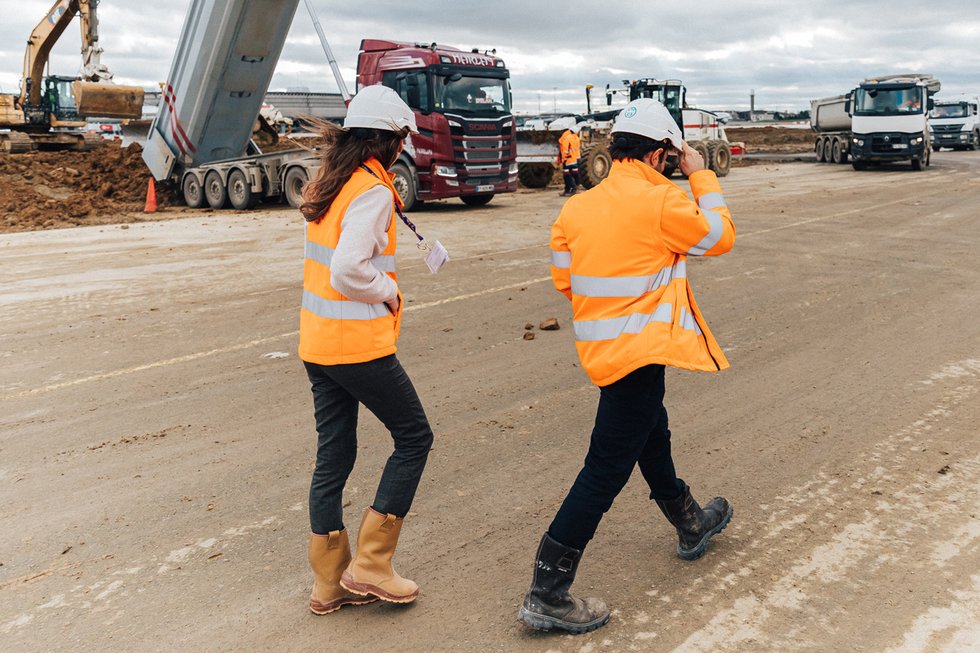A man's world: How women navigate male-dominated workplaces
Jan 08, 2021 - updated Sep 09, 2024
6 mins


Journalist
In 15 years of working on construction sites, Michelle has worked with another woman once—otherwise it’s her and anything from 5 to 2,000 men. She has coped with this by developing a work persona. “I take up as much room as I can. I change my tone. I swear more,” she said. “Not so much now, but five years ago, my husband would say when I came back from the site, ‘Okay, drop your balls at the door. You’re at home now.’”
Michelle’s behavior is common among women who work in male-dominated workplaces. But what other changes do women make to fit in—and how do they affect their career and sense of self, at work and at home?
Being the “only one” is still a common experience for women in the workplace. According to the Lean In’s Women in the Workplace report, one in five women often finds themselves the only woman, or one of the only women, in the room at work, and representation is even less for women of color. This has a significant psychological impact, mixed with the pressure to fit in. “You lose yourself, which is a shame,” said Michelle. “It’s something that now I really fight against.”
Coping with criticism
The Women in the Workplace report also found that four out of five women who work in a male-dominated environment face microaggressions at work, something that firefighter Amy* has experienced.
In the US, only 5% of career firefighters are women, and the numbers aren’t much better in England (8.7%), where Amy is the only woman at her station. In her four years on the job, she has experienced everything from exaggerated criticisms of her work to outright bullying and harassment from colleagues. After she won an award for being the best firefighter in her area, the response from her colleagues stung. “They ignored me,” she said. “They wouldn’t speak to me. To this day they’ve never said well done.”
Amy’s colleagues are also quick to criticize her. “I’ve known it where I’ve made a mistake and it’s practically got around half the service within 20 minutes. Whereas my male counterparts have made the same mistake, and they’ve been told, ‘Well, you won’t do that again.’ I feel as if I’m constantly being watched, and even the slightest errors are magnified.”
As a result, she tries to detract attention from herself. Amy describes herself as a naturally happy, bubbly person—but she doesn’t act like this at work. “They don’t want to see that. So I just keep quiet, put that away. I keep myself to myself,” she said.
Looking the part
Software engineer Lena manages herself at work in a different way. She is one of ten women in a department of around 100 employees. In a previous job, Lena was the only woman in a team of more than 60 men, something she would never do again. “They would steal ideas, intentionally exclude me from both technical and social meetings, discard what I said then repeat my suggestions in the next meeting as their own. Now I have a rule: I do not consider teams with more than 20 men and zero women,” she said.
Lena studied software engineering in college and was used to a masculine environment, yet when she started her previous job she had to change her appearance. “I felt the need to fit in by wearing jeans and hoodies,” she said. Even in her current workplace, where there is more balance, she is conscious of the way she presents herself. “I feel the need to be louder, to take up more physical space, to be somehow memorable,” she said. One easy way she does this is by wearing distinctive jewelry or clothes, but the right balance is hard to find. “They can’t be too feminine, as I would be considered less competent or distracting.”
She has the same feeling of external pressure as Amy; a niggling feeling that she cannot relax at work. “I have to stay alert all the time,” she said.
Developing a thick skin
Michelle avoids wearing skinny jeans or make-up when she is on building sites as she has been told they are a distraction to male colleagues. The one time she did, “it just created too much attention,” she said. But she has also gone through something more difficult to hide: two pregnancies. “It’s strange for them to see a woman, and then to see a pregnant woman was like a double whammy.” Her colleagues on the ground knew she was pregnant and were very supportive, which she says is typical. The vast majority of her difficulties at work have come from male managers.
Still, during her first pregnancy especially, she felt the need to appear strong at work. “Physically it was very hard,” she said. “And mentally, it was very hard, because I wanted to be able to do the job. They didn’t understand the physical toll it takes on your body.” On-site, she would work as normal, but when she had the chance she’d take a drive and have a 15-minute nap. “I always felt like I needed to be almost overdoing it to prove that I could do both,” she said.
For firefighter Amy, showing strength has come to mean hiding her emotions. Her job can involve dealing with horrific events. Afterward, the team returns to the fire station. “They’ll start making brews and we’ll have some cake. And no one talks about it,” she said. “I can see in their eyes, it’s very obvious to me that they are suffering. But they never discuss anything openly.” In turn, Amy has also had phases at work and at home where she withdraws emotionally. “I’ve become numb to certain things, and I’ve had to develop a very thick skin,” she said.
Joining in with the banter
A study by the Institute of Leadership & Management measured the effects of banter in the workplace. Its findings showed that banter causes men and women some anxiety at work, but both genders also use it as a way to bond with colleagues. One of the most significant differences between genders is its negative effect on a woman’s sense of self-belief—one in five women said it had caused them to lose confidence at work.
This is not the case for Michelle, who generally enjoys the on-site jokes. “You can’t take things too seriously and I learned very quickly that you have to push back,” she said. It helps that she is quick with a good comeback. Her unease comes from the disconnect between some of the topics she laughs about at work and her real values. “There are things that I say at work that I wouldn’t dream of saying in front of my husband because it’s that male banter. And I don’t need to impress him, I don’t need to fit in. Whereas at work I have felt like I do, so I might say something that actually doesn’t align with who I am, especially when I was in my 20s because I so desperately wanted to fit in.”
Will things get better?
A Ranstad study asked 4,200 construction workers why women leave the industry. Almost half (47%) said it was due to the male-dominated culture while 30% said it was because of outright discrimination. Michelle describes this as a chicken-and-egg scenario: “The more women we get in, the more chance to have a change in the culture, but the culture also kills more women getting in.” She considers her own career successful, partly due to her work persona. “It should be about being able to go on to a job, and through your own capabilities do that job, no matter what gender you are,” she said. “But other girls probably do have to adapt like I did to make life a little bit easier. And that does nothing for the future.”
Lena feels the same. She blames a “mentally unhealthy work environment, glass ceiling, and sticky floor” for women leaving the computer science industry. However, she has hope for the future, notably, because she spends a “good chunk” of her spare time running a women’s coding group in London. “Straight out of university, I felt very competitive towards women, because that’s what patriarchy teaches us… Now I am a strong believer that women should support each other,” she said.
For Amy, change is happening slowly but surely. “It’s like a seesaw that’s going to tip soon,” said Amy. “The younger, newer firefighters, they come in with a modern approach. The right approach.” Until then, she will continue working in the fire service. “I love my job,” she said. “And I’m not a victim. I don’t see myself as a victim. I see myself as just getting stronger.”
*Names have been changed
Photo by Thomas Decamps for Welcome to the Jungle
Follow Welcome to the Jungle on Facebook, LinkedIn, and Instagram, and subscribe to our newsletter to get our latest articles every day!

More inspiration: Inspiration for workers

From hobby to side hustle: 10 steps to turn your passion into a career in 2025
Have you been waiting for the right moment to turn what you love into a paid gig? 2025 is your time!
Dec 18, 2024

Patience, balance, and multitasking: How parenthood shaped my career
Parenthood changes everything—including your career. These working parents share exactly how.
Dec 11, 2024

The traits of a great boss (and how they make your work life better)
What makes a great boss? Effective leaders do more than manage tasks—they create a workplace where people feel supported, encouraged, and inspired.
Nov 13, 2024

Leading without limits: How to shine as a leader, title or no title
Lab expert Ginny Clarke explores how being a leader isn't just reserved for execs ...
Apr 09, 2024

How our burnt-out society can finally get some rest
Alex Soojung-Kim Pang unveils transformative strategies for slowing down our fast-paced lives.
Mar 19, 2024
The newsletter that does the job
Want to keep up with the latest articles? Twice a week you can receive stories, jobs, and tips in your inbox.

Looking for your next job?
Over 200,000 people have found a job with Welcome to the Jungle.
Explore jobs